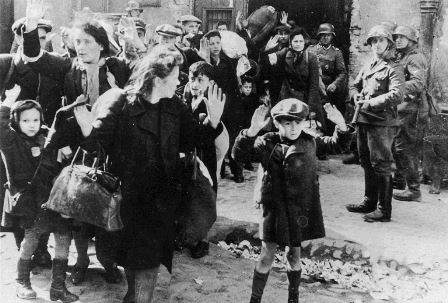Could Britain have done more to help the Jews in the Second World War?
The sources have been carefully selected from the Churchill Archive to explore the question of Churchill’s position on the Jews before, during and immediately after the Holocaust. Through this exploration students should be able to form an answer to the key question of whether the Allies could have done more to help the Jews during the Second World War. Teachers could ask students to work through the entire collection or get individuals, pairs or groups to assess a smaller selection before reporting back. It is probably better, however, to try and get the students to use the entire collection if possible. This way they can move beyond the sources as a collection of individual documents and use them more in the way an historian would, as a collection of documents which illustrate the past more effectively as the sum of their parts.
With this basis in mind, students who have looked at the collection might then be challenged with tasks which extend their thinking and understanding. For example:
Activity 1: Did Churchill’s actions reflect his position on the Jews?
You might ask students if/how the sources provide an answer to this question.
| Source | Suggests actions did reflect his position | Suggests the opposite | Evidence to support your judgement from within the source. |
| 1 | | | |
| 2 | | | |
| 3 | | | |
| 4 | | | |
| 5 | | | |
| 6 | | | |
➜ Download table (PDF)
➜ Download table (Word document)
Activity 2: Developing the debate
Students can succumb to the temptation to make quick judgements based on single sources, allowing themselves to assume that, at face value, the source tells the full story. As historians, they must develop their skills of interrogation of sources in order to piece together the historical picture with greater accuracy. It might be useful to ask them to discuss the following assertions in groups to deepen their thinking.
- Churchill’s opinions as an individual were always reflected in his actions as Prime Minister.
- The wider context of the Second World War prevented the allies from taking any direct action on the atrocities committed by the Nazis.
- Britain’s relationship to ‘World Jewry’ placed greater responsibility on it to take action against Nazi atrocities during the Second World War.
- The knowledge and understanding of the plight of the Jews held by individuals or groups reflect the knowledge and understanding of the nation.
- The opinions given by Churchill in letters are a true reflection of his intentions.
- The Holocaust caused Churchill to act in a different way towards the Jews and Palestine.

Jews from the Warsaw ghetto surrender to German soldiers after the uprising. (Photo by Keystone/Getty images)
Activity 3: Reaching a judgement and taking the question further
Students may return from Activities 1 and 2 with further questions for investigation. The sources suggest that Churchill was clearly a supporter of the Jews, and was keenly aware of their plight and the atrocities of the Holocaust. However there is little evidence of direct action to alleviate their suffering. This raises questions:
- How much power did Churchill and the Allies have to effect a change of circumstances for the Jews?
- Was defeating the Nazis, in the view of Churchill and the Allies, the only effective way to end the atrocities?
Students could use the sources and/or further research to help reach a judgement on these questions, or take their own questions further. They may wish to look at evidence from within the Churchill Archive as well as the links provided in the ‘Background information’ section to supplement this work.
➜ Back to investigation page
➜ Go to the sources
